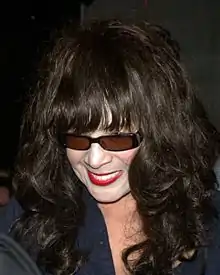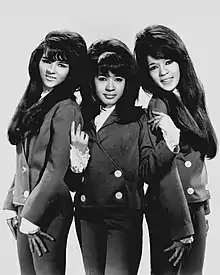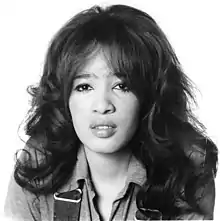Ronnie Spector
Veronica Yvette Spector (née Bennett; born August 10, 1943) is an American singer who fronted the girl group the Ronettes with her older sister Estelle Bennett and their cousin Nedra Talley. Together, they had a string of hits during the early to mid–1960s, such as "Be My Baby", "Baby, I Love You", and "The Best Part of Breakin' Up". Subsequently, Spector launched a solo career and has since released five studio albums (Siren in 1980, Unfinished Business in 1987, Something's Gonna Happen in 2003, Last of the Rock Stars in 2006, and English Heart in 2016) and one extended play (She Talks to Rainbows in 1999).
| Ronnie Spector | |
|---|---|
 Ronnie Spector in 2010 | |
| Background information | |
| Birth name | Veronica Yvette Bennett |
| Also known as |
|
| Born | August 10, 1943 New York City, New York, U.S. |
| Genres | |
| Occupation(s) | Singer |
| Instruments | Vocals |
| Years active | 1959–present |
| Labels | |
| Associated acts | |
| Website | ronniespector |
In 1986, Spector experienced a career resurgence when she was featured on Eddie Money's Grammy nominated pop rock song "Take Me Home Tonight" which reached number four on the Billboard Hot 100. She has sung and collaborated with multiple other acts. Spector is called the original "bad girl of rock and roll".[1][2] In 2007, Spector was inducted into the Rock and Roll Hall of Fame as a member of the Ronettes.[3]
Early life
Spector was born Veronica Yvette Bennett in New York City, the daughter of an African-American–Cherokee mother and Irish-American father. She and her sister, Estelle Bennett (1941–2009), were encouraged to sing by their large family, as was their cousin, Nedra Talley. The three women formed The Darling Sisters, known later as The Ronettes.[4]
Career
1963–1969: The Ronettes and early success

The Ronettes were a popular live attraction around the greater New York area in the early 1960s. Looking for a recording contract, they initially were signed to Colpix Records and produced by Stu Phillips.
After releasing a few singles on Colpix without success, they were signed by Phil Spector to Philles Records. Their relationship with Spector brought chart success with "Be My Baby", "Baby, I Love You", "The Best Part of Breakin' Up", "Do I Love You?", and "Walking in the Rain". The group had two top 100 hits in 1965: "Born to Be Together" and "Is This What I Get for Loving You?"
The group broke up in early 1967, following a European concert tour that included their appearance at the Moonlight Lounge, in Gelnhausen, Germany, where they entertained American military personnel. They did not reunite until their 2007 induction into the Rock and Roll Hall of Fame.
The group's last single, "I Can Hear Music", on the Philles Records label (# 133), was released in the fall of 1966. Instead of recording on the West coast, Ronnie and her group returned to New York City with producer Jeff Barry. Phil Spector kept many of the group's unreleased songs in the vault for years.
Ronnie's last recording of the 1960s "You Came, You Saw, You Conquered," was credited as "The Ronettes Featuring the Voice of Veronica," appeared in 1969 on Herb Alpert's A&M Records label, with "Oh I Love You", an old Ronettes B-side, as the flip. Only Ronnie's voice was used for the lead and backing vocals. Ronnie's recording and performing career had begun its long hiatus.
1970–1982: Solo career and Siren

In February 1971, during Phil Spector's tenure as head of A&R at Apple Records, Spector recorded the single "Try Some, Buy Some/Tandoori Chicken" at Abbey Road Studios, released as Apple 33 in the UK and Apple 1832 in the US.[5][6] The A-side was written by George Harrison, and produced by both him and Spector. Although the single was not a big hit, its backing track was used two years later for Harrison's own version of the song, on his chart-topping Living in the Material World album.[7] "Try Some, Buy Some" had another lasting influence when John Lennon recorded "Happy Xmas (War Is Over)" later the same year and asked Spector (co-producing again) to reproduce the mandolin-laden Wall of Sound he had created for Spector's single. Lennon liked the rockabilly B-side too; he sang it at his birthday party in New York in October 1971 (a recording of which has appeared on bootlegs).[8] Spector recorded other Harrison songs during those London sessions − including "You" and "When Every Song Is Sung" − but her versions were never released, even though a full album had been planned.[9]
In 1973, Spector reformed the Ronettes (as Ronnie Spector and the Ronettes) with two new members (Chip Fields Hurd, the mother of actress Kim Fields, and Diane Linton). They released a few singles on Buddah Records.[10] The records failed to chart and by 1975, Spector was recording as a solo act. She released the single "You'd Be Good For Me" on Tom Cat Records in 1975.[11]
In 1976, Spector sang a duet with Southside Johnny on the recording "You Mean So Much To Me", penned by Southside's longtime friend Bruce Springsteen and produced by Steven Van Zandt of the E Street Band. This was the final track on the Southside Johnny & the Asbury Jukes' debut album I Don't Want to Go Home. She also made appearances with the band the following year, including a cover version of Billy Joel's 1976 track Say Goodbye to Hollywood .
In her book, Spector recounted several abortive attempts to recapture mainstream success throughout the 1970s and early 1980s, during which time she was widely perceived as an oldies act. She recorded her first solo album in 1980, produced by Genya Ravan, which was a prelude to her work with Joey Ramone in the late 1990s.
1983–2002: "Take Me Home Tonight", Unfinished Business, and return to music
In 1986, Spector enjoyed a resurgence to popular radio airplay as the featured vocalist on Eddie Money's Top 5 hit, "Take Me Home Tonight", in which she answers Money's chorus lyric, "just like Ronnie sang", with, "be my little baby". The song's music video was one of the top videos of the year and in heavy rotation on MTV. During this period, she also recorded the song "Tonight You're Mine, Baby" (from the film Just One of the Guys).[12]
In 1988, Spector began performing at the Ronnie Spector's Christmas Party, a seasonal staple at B.B. King Blues Club & Grill in New York City.[13][14][15] In 1999, she released the album, She Talks to Rainbows, which featured a few covers of older songs. Joey Ramone acted as producer and appeared on stage with her to promote the record.
In 1988, Spector and the other members of the Ronettes sued Phil Spector for nonpayment of royalties and for unpaid income he made from licensing of Ronettes’ music. In 2001, a New York court announced a verdict in favor of the Ronettes, ordering Spector to pay $2.6 million in back royalties.[16] The judgment was overturned by the Court of Appeals in 2002 and remanded back to the Supreme Court. The judges found that their contract gave Spector unconditional rights to the recordings. Though the judges ruled that Ronnie is entitled to her share of the royalties which she had forfeited in her divorce settlement, they reversed a lower court's ruling that the group were entitled to the music industry's standard 50 percent royalty rate.[17] The final outcome had Spector paying a judgment in excess of 1.5 million dollars to the Ronettes.
2003–present: Collaborations and English Heart
In 2003, Spector provided backing vocals for The Misfits' album, Project 1950, on the songs "This Magic Moment" and "You Belong to Me."
In 2004, Spector was recognized for her contribution to American popular music when she was inducted into the Vocal Group Hall of Fame.

Spector provided guest vocals on the track "Ode to LA", on The Raveonettes' album Pretty in Black (2005). Spector's album, Last of the Rock Stars (2006), was released by Bad Girl Sounds and featured contributions from members of The Raconteurs, Nick Zinner of the Yeah Yeah Yeahs, The Raveonettes, Patti Smith, and Keith Richards. Spector herself co-produced two of the songs.
Despite objections from Phil Spector, the Ronettes were inducted into the Rock & Roll Hall of Fame in 2007.[18]
A Christmas EP, Ronnie Spector's Best Christmas Ever, was released on Bad Girl Sounds in November 2010, featuring five new Christmas songs.
In 2011, after the death of Amy Winehouse, Ronnie Spector released her version of Winehouse's single "Back to Black" (2006) as a tribute and for the benefit of the Daytop Village addiction treatment centers.[19] She has also performed this song as part of her live act, including during her UK tour in 2015.
In 2016, she released, through 429 Records, English Heart, her first album of new material in a decade.[20] The album features her versions of songs of the British Invasion by the Beatles, Rolling Stones, Yardbirds, Bee Gees, and others produced by Scott Jacoby.[21] English Heart peaked at #6 on the Billboard Top Heatseekers chart.[22]
On August 9, 2017, People Magazine premiered a new single Love Power produced by Narada Michael Walden by Ronnie Spector and The Ronettes, making it the first Ronettes single in decades.[23] The song was released August 18, 2017.
In 2018, Spector appeared in the music documentary; Amy Winehouse: Back to Black (2018), based on the singer Amy Winehouse, who died in 2011, and her final 2006 studio album Back to Black. The album was inspired by 1960s girl groups Winehouse gathered inspiration from listening to, such as The Ronettes.[24] It contains new interviews[25] as well as archival footage.[26]
In September 2020, it was announced that actress Zendaya will portray Spector in a biopic adapted from her memoir Be My Baby: How I Survived Mascara, Miniskirts And Madness.[27][28]
Personal life
Ronnie married Phil Spector in 1968 and took his name professionally.[29] In 1969, they adopted a son, Donté Phillip Spector. Two years later, Phil surprised her with adopted twins, Louis and Gary, for Christmas.[30] "The more kids I got, the further I was in that mansion and I never got out until I ran out and escaped," she said.[30] Ronnie detailed in her 1990 memoir, Be My Baby, that she escaped barefoot with the help of her mother in 1972.[31] "I knew that if I didn't leave I was going to die there," she said.[32]
According to Ronnie, Phil subjected her to years of psychological torment and sabotaged her career by forbidding her to perform. He surrounded the house with barbed wire and guard dogs, and he confiscated her shoes to prevent her from leaving.[33] On the rare occasions he allowed her out alone, she had to drive with a life-size dummy of Phil.[32] She began drinking and attending Alcoholics Anonymous meetings to escape the house. She recalled that Phil installed a gold coffin with a glass top in the basement, promising that he would kill her and display her corpse if she ever left him.[34]
In their 1974 divorce settlement, Ronnie forfeited all future record earnings, because Phil threatened to have a hit man kill her.[33] She received $25,000, a used car, and monthly alimony of $2,500 for five years.[33] In 1998, Ronnie testified that Phil had frequently pulled a gun on her during their marriage and threatened to kill her unless she surrendered custody of their children.[33] Phil was later convicted for the 2003 murder of actress Lana Clarkson.[35] Phil Spector died in a California prison hospital on January 16, 2021,[36] of COVID-19.[37]
Ronnie married her second husband, Jonathan Greenfield, in 1982.[38] They live in the area of Danbury, Connecticut with their two sons, Austin Drew and Jason Charles.[39]
Discography
The Ronettes
- Presenting the Fabulous Ronettes Featuring Veronica, 1964
- The Ronettes Greatest Hits – Volume 1, 1981
- The Ronettes Greatest Hits – Volume 2, 1981
- The Best of The Ronettes, 1992
Solo albums
| Title | Album details | Peak chart positions | |||||||
|---|---|---|---|---|---|---|---|---|---|
| US Heat | |||||||||
| Siren |
|
– | |||||||
| Unfinished Business |
|
– | |||||||
| The Last of the Rock Stars |
|
– | |||||||
| English Heart |
|
6 | |||||||
| "—" denotes a release that did not chart. | |||||||||
EPs
- She Talks to Rainbows EP, 1999
- Something's Gonna Happen EP, 2003
- Best Christmas Ever EP, 2010
Solo singles
- 1964: "So Young" (Phil Spector 1)
- 1964: "Why Don't They Let Us Fall In Love" (Phil Spector 1)
- 1971: Try Some, Buy Some (Apple 1832)
- 1975: "You'd Be Good For Me" (Tom Cat YB-10380)
- 1976: "Paradise" (Warner Spector SPS 0409)
- 1977: "Say Goodbye To Hollywood" (Epic 8-50374)
- 1978: "It's A Heartache" (Alston 3738)
- 1980: "Darlin'" (Polish PR-202)
- 1987: "Who Can Sleep" (Columbia 38-07082)
- 1987: "Love On A Rooftop" (Columbia 38-07300)
References
- Donovan, Patrick (April 12, 2006). "The Last of the Rock Stars". TheAge. Australia.
- "The Ronettes – Inductees". The Vocal Group Hall of Fame Foundation. 2004. Archived from the original on March 20, 2007.
- "The Ronettes". Rock & Roll Hall of Fame. Retrieved January 18, 2019.
- Sisario, Ben (February 16, 2009). "A Life of Troubles Followed a Singer's Burst of Fame". New York Times. Retrieved April 11, 2013.
- Castleman, Harry & Podrazik, Walter J. (1976). All Together Now: The First Complete Beatles Discography 1961–1975. New York, NY: Ballantine Books. p. 100.CS1 maint: uses authors parameter (link)
- Badham, Keith (2002). The Beatles Diary Volume 2: After the Break-Up 1970–2001. London: Omnibus Press. pp. 25–26.
- Leng, Simon (2006). While My Guitar Gently Weeps: The Music of George Harrison. Milwaukee, WI: Hal Leonard. pp. 133–34.
- Badham, Keith (2002). The Beatles Diary Volume 2: After the Break-Up 1970–2001. London: Omnibus Press. p. 51.
- Harrison, George Harrison (2002). I Me Mine. San Francisco, CA: Chronicle Books. pp. 218, 228.
- "Ronnie Spector Returns" (PDF). Record World: 23. May 18, 1974.
- "Top Singles Picks". Billboard: 67. September 6, 1975.
- "Ronnie Spector interview: 'The more Phil tried to destroy me, the stronger I got'". Telegraph.co.uk. Retrieved August 6, 2017.
- Reed, James (December 23, 2008). "Still rockin' around". Boston.com.
- "RONNIE SPECTOR'S BEST CHRISTMAS PARTY EVER!". B.B. King Blues Club & Grill. New York. 2013. Retrieved May 28, 2014.
- "Events: Ronnie Spector". NorthJersey.com. 2013. Archived from the original on May 28, 2014. Retrieved May 28, 2014.
- "Ronettes Entitled to Back Pay From Phil Spector, Judge Rules". Los Angeles Times. June 17, 2000.
- F. Worth, Robert (October 18, 2001). "A Sad Song for the Ronettes: Court Reverses Royalty Rights". New York Times.
- "Phil Spector blasts The Ronettes' Hall Of Fame induction". NME. March 7, 2007. Retrieved December 8, 2020.
- "Exclusive: Ronnie Spector Pays Tribute to Amy Winehouse". Rolling Stone. July 27, 2011.
- "Songs We Love: Ronnie Spector, 'I'd Much Rather Be With The Girls'". NPR. April 4, 2016.
- "Ronnie Spector on Keith Richards, David Bowie and Life After Phil". Rolling Stone. April 14, 2016.
- "Ronnie Spector – English Heart". AllMusic. April 14, 2016.
- "FIRST LISTEN: Rock Queen Ronnie Spector Releases 'Love Power,' Her First Song in Decades with the Ronettes". People. August 9, 2017.
- Snapes, Laura (October 12, 2018). "Hologram of Amy Winehouse set for 2019 worldwide tour". The Guardian. Retrieved October 12, 2018.
- Bowenbank, Starr (September 19, 2018). "Amy Winehouse 'Back to Black' Documentary Announced: Watch the Trailer". Billboard. Retrieved October 12, 2018.
- Bliss, Karen (September 20, 2018). "Amy Winehouse 'Back to Black' Documentary Offers Revealing Commentary from Mark Ronson, Salaam Remi & More". Billboard. Retrieved October 12, 2018.
- Aniftos, Rania (September 29, 2020). "Zendaya to Play Ronnie Spector in Upcoming Film on Singer's Life". Billboard. Retrieved December 8, 2020.
- Fleming Jr, Mike (September 29, 2020). "Zendaya In Talks To Play Ronnie Spector In A24 Film About Iconic Singer; Label Acquires Life Rights & 'Be My Baby' Autobiography". Deadline. Retrieved December 8, 2020.
- "Ronnie Spector – Singer – Biography". Biography.com. Retrieved August 27, 2015.
- Muller, Marissa G. (November 12, 2013). "Ronnie Spector: The Original Icon". Noisey.
- "Entertainment". MSN Entertainment. CreateSpace Independent Publishing Platform. May 6, 2010. p. 7. Archived from the original on May 29, 2014.
- Anson, Robert Sam (June 2003). "Legend with a Bullet". Vanity Fair.
- Arena, Salvatore (June 11, 1998). "MARRIAGE HIT WRONG CHORD, SAYS RONETTE". New York Daily News.
- Harvey, Chris (January 17, 2019). "Ronnie Spector interview: 'MeToo is now, but I've been living it my whole life'". The Telegraph. ISSN 0307-1235. Retrieved December 8, 2020.
- Moore, Solomon; Archibold, Randal C. (April 13, 2009). "Phil Spector Found Guilty of Killing Actress (Published 2009)". The New York Times. ISSN 0362-4331. Retrieved December 8, 2020.
- Davies, Caroline (January 17, 2021). "Phil Spector, pop producer convicted of murder, dies aged 81". The Guardian. Retrieved January 17, 2021.
- Grimes, William (January 17, 2021). "Phil Spector, Famed Music Producer Imprisoned in Slaying, Dies at 81". The New York Times. Retrieved January 17, 2021.
- Sisario, Ben (February 16, 2009). "A Life of Troubles Followed a Singer's Burst of Fame". The New York Times.
- Tuccio, M.B. (May 15, 2012). "'Beyond the Beehive' tells Ronnie Spector's life story". Connecticut Post.
Further reading
- Gensler, Andy (December 21, 2010). "Asked & Answered: Ronnie Spector". The New York Times.
- Connolly, M. Delmonico (2020). Ronnie Spector in Rock Gomorrah. Gold Line Press.